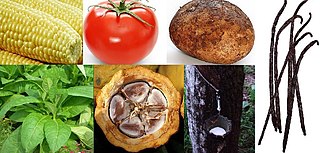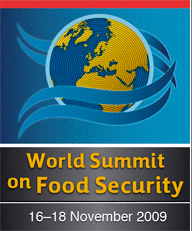
The Food and Agriculture Organization of the United Nations (FAO) is a specialized agency of the United Nations that leads international efforts to defeat hunger and improve nutrition and food security. Its Latin motto, fiat panis, translates to "let there be bread". It was founded on 16 October 1945.
The International Treaty on Plant Genetic Resources for Food and Agriculture, is a comprehensive international agreement in harmony with the Convention on Biological Diversity, which aims at guaranteeing food security through the conservation, exchange and sustainable use of the world's plant genetic resources for food and agriculture (PGRFA), the fair and equitable benefit sharing arising from its use, as well as the recognition of farmers' rights. It was signed in 2001 in Madrid, and entered into force on 29 June 2004.

World Food Day is an international day celebrated every year worldwide on October 16 to commemorate the date of the founding of the United Nations Food and Agriculture Organization in 1945. The day is celebrated widely by many other organizations concerned with hunger and food security, including the World Food Programme, the World Health Organization and the International Fund for Agricultural Development. WFP received the Nobel Prize in Peace for 2020 for their efforts to combat hunger, contribute to peace in conflict areas, and for playing a leading role in stopping the use of hunger in the form of a weapon for war and conflict.

The International Union of Forest Research Organizations (IUFRO) is a non-profit, non-governmental international network of forest scientists, headquartered in Austria. In 2019, IUFRO counted 630 Member Organizations worldwide.

The Great Green Wall or Great Green Wall of the Sahara and the Sahel is a project adopted by the African Union in 2007, initially conceived as a way to combat desertification in the Sahel region and hold back expansion of the Sahara desert, by planting a wall of trees stretching across the entire Sahel from Djibouti, Djibouti to Dakar, Senegal. The original dimensions of the "wall" were to be 15 km wide and 7,775 km long, but the program expanded to encompass nations in both northern and western Africa. The concept evolved into promoting water harvesting techniques, greenery protection and improving indigenous land use techniques, aimed at creating a mosaic of green and productive landscapes across North Africa. Later it adopted the view that desert boundaries change based on rainfall variations.

A crop is a plant that can be grown and harvested extensively for profit or subsistence. In other words, crop is a plant or plant product that is grown for a specific purpose such as food, fibre or fuel.

The year 2011 was declared the International Year of Forests by the United Nations to raise awareness and strengthen the sustainable management, conservation and sustainable development of all types of forests for the benefit of current and future generations.

Livestock's Long Shadow: Environmental Issues and Options is a United Nations report, released by the Food and Agriculture Organization (FAO) of the United Nations on 29 November 2006, that "aims to assess the full impact of the livestock sector on environmental problems, along with potential technical and policy approaches to mitigation". It stated that livestock accounts for 18% of anthropogenic greenhouse gas emissions, a figure which FAO changed to 14.5% in its 2013 study Tackling climate change through livestock.
Crop diversity or crop biodiversity is the variety and variability of crops, plants used in agriculture, including their genetic and phenotypic characteristics. It is a subset of a specific element of agricultural biodiversity. Over the past 50 years, there has been a major decline in two components of crop diversity; genetic diversity within each crop and the number of species commonly grown.

The World Summit on Food Security took place in Rome, Italy between 16 and 18 November 2009. The decision to convene the summit was taken by the Council of the Food and Agriculture Organization of the United Nations (FAO) in June 2009, at the proposal of FAO Director-General Dr Jacques Diouf. Sixty Heads of State and Government and 192 ministers, from 182 countries and the European Community, attended the summit, which took place at FAO's headquarters.

The International Day of Forests was established on the 21st day of March, by resolution of the United Nations General Assembly on November 28, 2013. Each year, various events celebrate and raise awareness of the importance of all types of forests, and trees outside forests, for the benefit of current and future generations. Countries are encouraged to undertake efforts to organize local, national, and international activities involving forests and trees, such as tree planting campaigns, on International Day of Forests. The Secretariat of the United Nations Forum on Forests, in collaboration with the Food and Agriculture Organization, facilitates the implementation of such events in collaboration with governments, the Collaborative Partnership on Forests, and international, regional and subregional organizations. International Day of Forests was observed for the first time on March 21, 2013.
The International Year of Soils, 2015 was declared by the Sixty-eighth session of the United Nations General Assembly on December 20, 2013, after recognizing December 5 as World Soil Day.

A staple food, food staple, or simply staple, is a food that is eaten often and in such quantities that it constitutes a dominant portion of a standard diet for an individual or a population group, supplying a large fraction of energy needs and generally forming a significant proportion of the intake of other nutrients as well. For humans, a staple food of a specific society may be eaten as often as every day or every meal, and most people live on a diet based on just a small variety of food staples. Specific staples vary from place to place, but typically are inexpensive or readily available foods that supply one or more of the macronutrients and micronutrients needed for survival and health: carbohydrates, proteins, fats, minerals, and vitamins. Typical examples include grains, seeds, nuts and root vegetables. Among them, cereals, legumes and tubers account for about 90% of the world's food calorie intake.

2016 was declared as the International Year of Pulses by the sixty eighth session of the United Nations General Assembly on December 20, 2013. The Food and Agriculture Organization (FAO) of the United Nations has been nominated to declare a year for pulses, more commonly known as legumes.

The banana industry is an important part of the global industrial agrobusiness. About 15% of the global banana production goes to export and international trade for consumption in Western countries. They are grown on banana plantations primarily in the Americas.
Seth Sunday Ajayi is a Nigerian scientist, scholar and the first African Professor of Wildlife Ecology.
Ecocrop was a database used to determine the suitability of a crop for a specified environment. Developed by the Food and Agriculture Organization of the United Nations (FAO) it provided information predicting crop viability in different locations and climatic conditions. It also served as a catalog of plants and plant growth characteristics.

Endorsed in December 2017, the United Nations Decade of Family Farming 2019-2028 seeks to place family farming at the center of national public policies and investments. In declaring this decade, the United Nations General Assembly recognized the importance of family farming in reducing poverty and improving global food security. The UN Decade of Family Farming is led by the Food and Agriculture Organization (FAO) and the International Fund for Agricultural Development (IFAD) in collaboration with governments and civil society organizations.

Smart Agriculture Competition is an annual greenhouse challenge and agricultural productivity competition launched by the largest agriculture technology platform Pinduoduo to encourage the use of data-driven tools to improve agricultural productivity and environmental sustainability.














